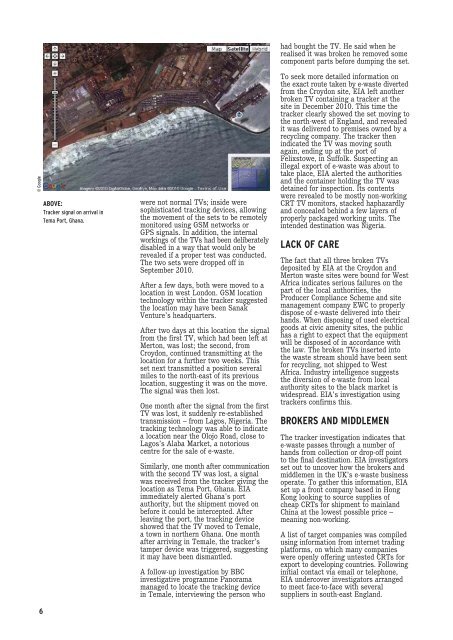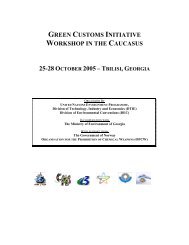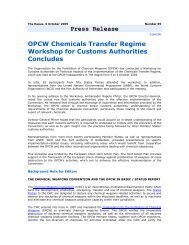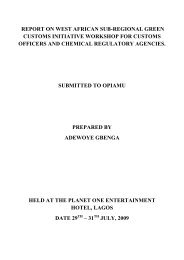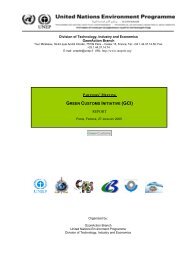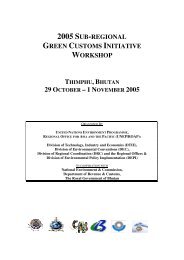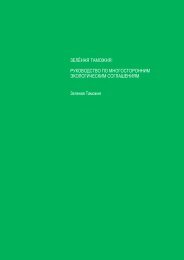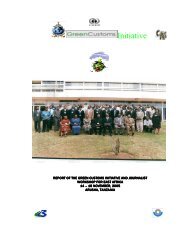EIA, "System Failure" - Green Customs Initiative
EIA, "System Failure" - Green Customs Initiative
EIA, "System Failure" - Green Customs Initiative
You also want an ePaper? Increase the reach of your titles
YUMPU automatically turns print PDFs into web optimized ePapers that Google loves.
© Google<br />
6<br />
ABOVE:<br />
Tracker signal on arrival in<br />
Tema Port, Ghana.<br />
were not normal TVs; inside were<br />
sophisticated tracking devices, allowing<br />
the movement of the sets to be remotely<br />
monitored using GSM networks or<br />
GPS signals. In addition, the internal<br />
workings of the TVs had been deliberately<br />
disabled in a way that would only be<br />
revealed if a proper test was conducted.<br />
The two sets were dropped off in<br />
September 2010.<br />
After a few days, both were moved to a<br />
location in west London. GSM location<br />
technology within the tracker suggested<br />
the location may have been Sanak<br />
Venture’s headquarters.<br />
After two days at this location the signal<br />
from the first TV, which had been left at<br />
Merton, was lost; the second, from<br />
Croydon, continued transmitting at the<br />
location for a further two weeks. This<br />
set next transmitted a position several<br />
miles to the north-east of its previous<br />
location, suggesting it was on the move.<br />
The signal was then lost.<br />
One month after the signal from the first<br />
TV was lost, it suddenly re-established<br />
transmission – from Lagos, Nigeria. The<br />
tracking technology was able to indicate<br />
a location near the Olojo Road, close to<br />
Lagos’s Alaba Market, a notorious<br />
centre for the sale of e-waste.<br />
Similarly, one month after communication<br />
with the second TV was lost, a signal<br />
was received from the tracker giving the<br />
location as Tema Port, Ghana. <strong>EIA</strong><br />
immediately alerted Ghana's port<br />
authority, but the shipment moved on<br />
before it could be intercepted. After<br />
leaving the port, the tracking device<br />
showed that the TV moved to Temale,<br />
a town in northern Ghana. One month<br />
after arriving in Temale, the tracker’s<br />
tamper device was triggered, suggesting<br />
it may have been dismantled.<br />
A follow-up investigation by BBC<br />
investigative programme Panorama<br />
managed to locate the tracking device<br />
in Temale, interviewing the person who<br />
had bought the TV. He said when he<br />
realised it was broken he removed some<br />
component parts before dumping the set.<br />
To seek more detailed information on<br />
the exact route taken by e-waste diverted<br />
from the Croydon site, <strong>EIA</strong> left another<br />
broken TV containing a tracker at the<br />
site in December 2010. This time the<br />
tracker clearly showed the set moving to<br />
the north-west of England, and revealed<br />
it was delivered to premises owned by a<br />
recycling company. The tracker then<br />
indicated the TV was moving south<br />
again, ending up at the port of<br />
Felixstowe, in Suffolk. Suspecting an<br />
illegal export of e-waste was about to<br />
take place, <strong>EIA</strong> alerted the authorities<br />
and the container holding the TV was<br />
detained for inspection. Its contents<br />
were revealed to be mostly non-working<br />
CRT TV monitors, stacked haphazardly<br />
and concealed behind a few layers of<br />
properly packaged working units. The<br />
intended destination was Nigeria.<br />
LACK OF CARE<br />
The fact that all three broken TVs<br />
deposited by <strong>EIA</strong> at the Croydon and<br />
Merton waste sites were bound for West<br />
Africa indicates serious failures on the<br />
part of the local authorities, the<br />
Producer Compliance Scheme and site<br />
management company EWC to properly<br />
dispose of e-waste delivered into their<br />
hands. When disposing of used electrical<br />
goods at civic amenity sites, the public<br />
has a right to expect that the equipment<br />
will be disposed of in accordance with<br />
the law. The broken TVs inserted into<br />
the waste stream should have been sent<br />
for recycling, not shipped to West<br />
Africa. Industry intelligence suggests<br />
the diversion of e-waste from local<br />
authority sites to the black market is<br />
widespread. <strong>EIA</strong>'s investigation using<br />
trackers confirms this.<br />
BROKERS AND MIDDLEMEN<br />
The tracker investigation indicates that<br />
e-waste passes through a number of<br />
hands from collection or drop-off point<br />
to the final destination. <strong>EIA</strong> investigators<br />
set out to uncover how the brokers and<br />
middlemen in the UK's e-waste business<br />
operate. To gather this information, <strong>EIA</strong><br />
set up a front company based in Hong<br />
Kong looking to source supplies of<br />
cheap CRTs for shipment to mainland<br />
China at the lowest possible price –<br />
meaning non-working.<br />
A list of target companies was compiled<br />
using information from internet trading<br />
platforms, on which many companies<br />
were openly offering untested CRTs for<br />
export to developing countries. Following<br />
initial contact via email or telephone,<br />
<strong>EIA</strong> undercover investigators arranged<br />
to meet face-to-face with several<br />
suppliers in south-east England.


